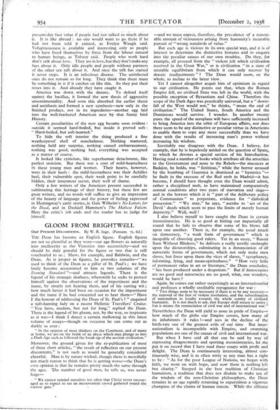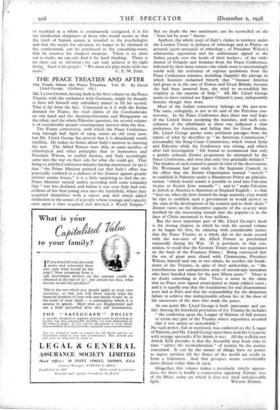GLOOM FROM BRIGHTWELL
Our Present Discontents. By W. R. Inge. (Putnam. 7s. 6d.)
THE Dean has become an English figure. English figures are not so plentiful as they were—our age flowers• as naturally
into mediocrity as the Victorian into eccentricity—and we should be duly grateful for the figure or two that is still vouchsafed to us ; Shaw, for example, and Baldwin, and the Dean. As is proper in figures, he provokes remarks—" we
used to think of the Dean as a pillar of St. Paul's ; we have lately become accustomed to him as two columns of the Evening Standard "—and attracts- legends. There is the legend of his strategic deafness, wherewith he seeks to protect himself against the observations of the impertinent and the inane, by simply not hearing them, and of his cutting wit ; how much better it had been on occasion for the impertinent and the inane if he had consented not to hear them—" Have I the honour of addressing the Dean of St. Paul's ?." enquired a tuft-hunting lady on a recent Hellenic Travellers' Cruise-.- "You have, madam, but not for long," replied the Dean.
There is the legend of his gloom, not, by the way, so inspissate as it was—I think I detect a certain mellowing in this latest volume of essays—though on occasion he can come out as darkly as ever : " In the opinion of most thinkers on the Continent, and of many at home, we are on the brink .of an abyss which may plunge us into a Dark Age such as followed the break-up of the ancient civilisation."
Moreover, the ground given for the re-publication of most of these short articles, " the result of reflection on our present. discontents," is not such as would be generally considered
cheerful. Man is by nature wicked, though there is mercifully pot much reason to think that he is getting worse—the Dean's own opinion is that he remains pretty much the same through the ages. The number of good men, he tells us, was never
large- " We cannot remind ourselves too often that Christ never encour- aged us to expect to see an inconvenient crowd gathered-round-the
narrow gate." - —and we must expect, therefore, the prevalence of a reason- able amount of viciousness arising from humanity's incurable pursuit of "wrong standards of value."
But each age is vicious in its own special way, and it is of interest to, determine the distinctive features and to enquire into the peculiar causes of our own troubles. Do they, fot example, all proceed from the " violent jolt which civilisation received in the Great War," or is civilisation " in a state of unstable equilibrium from which it can only recover by drastic readjustments " ? The Dean would seem, on the whole, to incline to the latter view.
Yet I cannot altogether acquit him of optimism in regard to our civilisation. He points out that, when the Roman Empire fell, no civilised State was left in the world, with the possible exception of Byzantium and China. Therefore the scope of the Dark Ages was practically universal, but a " down:- fall of the West would not," he thinks, "mean the end of civilisation." The United States, South America and the Dominions would survive. I wonder. In another twenty years the speed of the aeroplane will have sufficiently increased to bring America into the orbit of European affairs, nor does there seem to be any distinctive or peculiar virtue in Americans to enable them to cope any more successfully than we have done with the results of increasing man's power without increasing his wisdom.
Inevitably one disagrees with the Dean. I believe, fot example, that he is hopelessly misled on the question of Spain, to which he devotes a special section of his Introduction. Having read a number of books which attribute all the'atrocities to the Government and none to the Rebels—the massacre at Badajoz, he holds, was " fictitious," while the horror aroused by the bombing of Guernica is dismissed as " hysterics "--4) he finds in the excesses of the Red mob in Madrid—it hai become, I should have thought even the Dean would admit, rather a disciplined mob, to have maintained comparatively normal conditions after two years of starvation and siege— and in the horrors which it is " part of the deliberate policy of Communism " to perpetrate, evidence for " diabolical possession." " We may," he says, " ascribe to act of the Devil ' deeds which seem to pass the limits of merely humaii depravity." Well, well !
I also- believe myself to have caught the Dean in certain inconsistencies. He is so good at hitting out impartially all round that he fails to observe that some of his blows fall upon one another. There is, for example, the usual attack on democracy, " a weak forin of government " which is incapable of choosing good rulers. Yet in an essay, " Russia Seen Without Blinkers," he delivers a really terrific onslaught upon the dictatorships, culminating in a denunciation of all autocratic forms of government, which not only make men slaves, but force upon them the vices of slaves, " sycophancy; informing, lying, and mean-spiritedness." How very little of permanent value in art or literature," the Dean concludes; " has been produced under a despotism." But if democracies are no good and autocracies are no good, what, one wonders; would he have ?
Again, lie comes out rather surprisingly as an internationalist and professes a wholly -creditable repugnance for war : Two things seem to be necessary if there is to be any recovery—, the removal of the fear of violent revolution, •and the subordination of nationalism to loyalty towards the whole _comity of civilised humanity. It is not much to ask, that Europe shall return to sanity ; but it means the renunciation of civil' war and of international war."
Nevei-theless the Dean will yield to none in pride of Empire--:. how much of the globe our Empire covers, how many of
its inhabitants ' it rules !—and sees in the decline of the birth-rate one of the greatest evils of our time. But inter-: nationalism is incompatible with Empire, and swarming: populations are one of the causes of civil and international war.
But when I have said all that can be said by way -cif expressing disagreements and spotting inconsistencies, let nie. put it on .record that I have read these essays with profit and
delight.. The Dean. is continuously interesting, almost con- tinuously wise, and is as often witty as any man has a right to be : " As for the poor League of Nations, we began with faith, we went on with hope, and now there is nothing left but charity." Steeped in the best tradition of Christian humanism, a tradition that does not disdain to make use of the wisdom of the non-Christian philosophers, the Dean remains in an age rapidly returning to superstition 'a vigorous champion of the claims of human reason: While the •sillineS1 of mankind as a whole is continuously castigated, it is for the intellectual sloppiness of those who would assure us that the truth of human nature is revealed to the psychologist, and that the recipe for salvation, no longer to be obtained in the confessional, can be purchased in the consulting-room, that he reserves his sharpest weapons. There is no short cut to truth ; we can only find it by hard thinking. There is no short cut to salvation ; we can only achieve it by right living. Such is his gospel : " We must not play tricks with our



























































 Previous page
Previous page